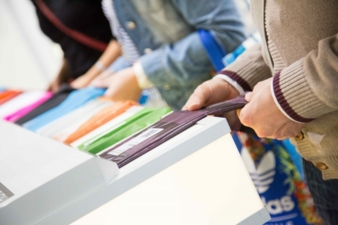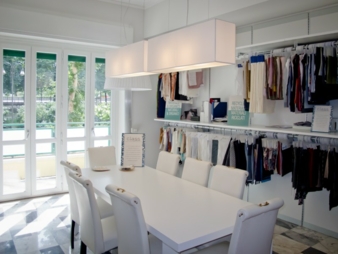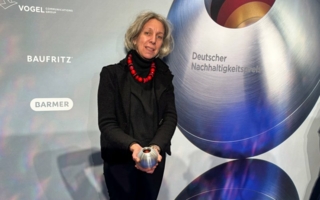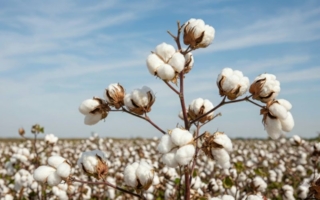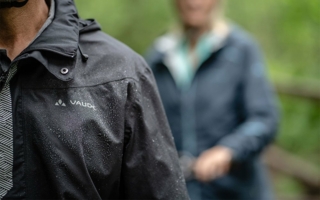30/04/2015 — auf Deutsch lesen
Twenty-four seven
What are the conditions for sustainable sourcing? Trade shows or online? Both are possible - whether through the traditional, trade show route or via newer, round-the-clock online platforms. Textile Network has taken a look around and chosen some examples. Either way – sustainable sourcing is taking the world by storm!
Selecting materials comes at the very start of every design process, and in this regard companies are now increasingly looking for environmentally-friendly and fairly-produced alternatives. The traditional route remains the trade show. What just a few years ago was still like searching for a needle in a haystack has become much easier today. For the majority of trade show organisers, the issue of sustainability is becoming more and more important and, for this reason, a number of initiatives and measures have already been created: ranging from dedicated areas and catalogues for environmentally-friendly producers to information stands for certifiers and seminars – every trade show presents the topic in a slightly different way.
The sports and outdoors sector has found itself facing the challenges of toxin-free production and has come under pressure from initiatives such as Greenpeace’s Detox campaign. At Performance Days, the trade fair for functional textiles which takes place twice per year in Munich, representatives from renowned sports brands make up a significant proportion of the attendees. “To some extent, the buyers of these brands are looking exclusively for certified materials (Editor’s note: e.g. Bluesign) ranging from textiles to accessories, such as zips and buttons,” said Stefanie Sacherow, press officer for Performance Days. In order to meet this demand, the offerings at Performance Days consist of three components: Firstly, there is the traditional exhibition catalogue, in which all Bluesign-certified producers are indicated with symbols on the show floorplan.
Additionally, visitors have the chance to use the online Product Library to get an overview of all Bluesign-certified exhibitors, as well as those who work with recycled materials. Alongside this, there is a growing supporting programme of presentations and talks on topics including certification, social standards, animal welfare, and innovations such as textiles made of coconut shells, coffee, or algae. “For around five years, sustainability has been an integral part of our show. Within this time, the topic of sustainability has become the strongest within our lecture series – with both the largest number of presentations as well as the largest number of attendees.” The market appears to be highly sensitised to this issue. As Sacherow explained, awareness of sustainable production and sustainability standards is especially high within the European market. In Asia, however, it is a different story.
This impression was confirmed by Bernd Müller, who is responsible for the issue of sustainability and textiles at Messe Frankfurt Exhibition GmbH. However, he also stressed that there are already good initiatives that show that progress is being made in Asia – in China, for example, at Intertextile Shanghai Apparel Fabrics, the biannual international trade show for clothing and textiles trimmings. First established there in 2014, the “All About Sustainability Area” is a combination of information on certifiers and standards with the presentation of outfits as well as complementary seminars. “We are increasingly noticing a great interest in the Chinese market.
At Intertextile Shanghai, we are therefore starting with a wide offering of information, and want to successively expand this offering in the coming years,” said Müller. In this way, show attendees are slowly being introduced to the issue of sustainability. Topics such as certifications, dealing with chemicals and corporate social responsibility are at the focus of the presentations. For sourcing, designers are able to turn to the certifiers’ information stands and can, for example, use the Global Organic Textile Standards (GOTS) database to search for appropriate producers at the show.
The integration of sustainability has already long been an essential part of the European events organised by Messe Frankfurt. Since the 2006/2007 season, the show’s organisers have brought the issue to the forefront and at the same time offer support in sourcing environmentally-friendly textiles. At Texworld Paris, sustainability has been firmly integrated into the show for years now and sourcing sustainable materials is also made very easy with its “Sustainable Sourcing Itinerary” catalogue: This guide currently displays around 80 suppliers of eco-fair materials in a floorplan format. Textiles that are certified by GOTS, Organic Exchange, Bluesign, SA 8,000 and WRAP are all listed within the guide. These range from natural fibres such as cotton, linen and hemp, to regenerated and recycled fibres. These are indicated using a system that rates exhibitors according to social standards, environmentally-friendly production and materials.
The same system is also used by the Frankfurt Messe at the Heimtextil trade show. For several years, this annual show for home and commercial textiles, which takes place at the beginning of each year, has already offered interior designers, furniture manufacturers and designers the opportunity to find sustainable textiles at a glance. Their “Green Directory” lists all sustainable producers at the show. As of this year, their offerings on sourcing are being expanded with the “Day of Sustainability”, which will feature talks providing information on the topics of production, social standards and corporate social responsibility. In the purpose-built “Green Village”, certifiers such as Bluesign and initiatives such as the Aid by Trade Foundation will also showcase their abilities and offer information.
“The issue of sustainability has been well established in the Heimtextil show for some years now and is much more than just a trend to us,” explained Ulrike Wechsung, director of home textiles at Heimtextil. “With the creation of the ‘Green Village’ in Galleria 1, Heimtextil 2015 offers a dedicated platform for certifiers and interest groups from the sustainability sector for the first time.” The details of the various producers at all of the events staged by Messe Frankurt can be later accessed online using the “Productpilot” service. However, what is not (yet) available is a filter function for sustainable suppliers.
For sourcing eco-fair materials online, Munich Fabric Start offers a combination of in-show sourcing and year-round online sourcing opportunities. As is the case at Heimtextil, the biannual, Munich-based materials show also features a dedicated knowledge hub for sustainability – the “Eco Village”, where organisations and certifying bodies provide information on topics such as resource conservation and ecological standards, and talks and workshops about sustainable production are held. The centrepiece of the area is the “Organic Selection”, which showcases around 500 certified, sustainably-produced materials. Its positive reception in Munich proves that sustainably-sourced alternatives are in demand and has prompted the show’s organisers to expand the area. “The Eco Village’s increase in size came at exactly the right time.
The demand for information and the quality of the dialogue between attendees and international CSR experts are both very high and stretch across a range of sectors – from environmentally-friendly sourcing, through certifications and legal aspects, to sustainability communication. The Organic Selection specifically showcases greener alternatives to current material trends. The innovations can be seen in new materials, fibres, and blends – this proves that the Eco Village, with its environmentally-friendly developments, is well suited as a hub of innovation for the entire sector,” said Sebastian Klinder, managing director of Munich Fabric Start.
The Organic Selection presents a selection of sustainable fabric samples and accessories with direct reference to the manufacturers. The materials are accompanied by a criteria system with symbols that differentiate between natural fibres, synthetic fibres, recycled materials as well as fair production. The entire offering has also been available online since 2014. Filters help with the search, allowing users to differentiate between certifications, materials and their percentage compositions as well as their applications – regardless of whether they are looking for accessories, dresses, jeans or coats.
Online networks and platforms – such as C.L.A.S.S., Interloom, the Future Fabrics Expo and The Source from the Ethical Fashion Forums - are aiming to facilitate the dialogue within the textiles and fashion industry. Collaboration will be encouraged and networking is at the focus. This brings together designers and textiles producers from all levels of the supply chain – from fibres to manufacture. Alongside this, “The Source“ platform from the Ethical Fashion Forum in London offers in-depth information and a database listing both eco-fair producers, designers and brands as well as buyers and shops.
The C.L.A.S.S. network from Milan works in a similar way, but has a stronger focus on preliminary stages and materials, rather than on fashion and retailers. The members of the network are primarily producers and designers. These members are shown selected collections in dedicated showrooms in Milan, Madrid, Copenhagen, London and New York. Designers are also able to use the database and receive personal consultation from the experts at C.L.A.S.S. The response has been great: “It is not about success, but more about having become a reference point in the innovation market thanks to the professional and new approach that sees responsibility as a key element,” said Giusy Bettoni, founder of C.L.A.S.S.
The fact that demand for eco-fair materials is rising has not gone unnoticed by Sophia Opperskalski, founder of Interloom in Berlin. Established in 2012, the platform is showing strong growth and now has over 600 registered companies, including around 20 suppliers of textiles and accessories. The concept is comparable to C.L.A.S.S. – there is a dedicated showroom and expert knowledge in presentations; users can also employ the platform to send order requests to individual suppliers, and to receive consultation or expand their networks via Interloom. “We receive numerous requests from customers who are on the hunt for GOTS-certified materials, for example.
We not only support our customers in finding these materials, but also help to compare materials with regard to various sustainability criteria as well as to find suppliers with the correct amounts,” explained Opperskalski. However, it is not only natural fibres that are in demand, the interest in more specialised materials and alternatives to cotton has especially grown. Accordingly, Interloom provides support for requests for textiles which are not yet particularly easy to find on the market in a sustainable form – such as waterproof functional textiles.
The trade show organisers and the creators of the online portals are receiving positive feedback and expect the market for fair and ecologically-produced textiles to grow in the future. While the offerings for sustainable fashion, sport and home textiles are already considerable, the markets for technical and medical textiles still have a lot of catching up to do. However, it will not be long before sustainable sourcing platforms will arrive in these markets too. After all, there is already a great number of role models in other sectors.
[Rebecca Espenschied]
In this series until now published:
Part 1 “Not if, but how“

